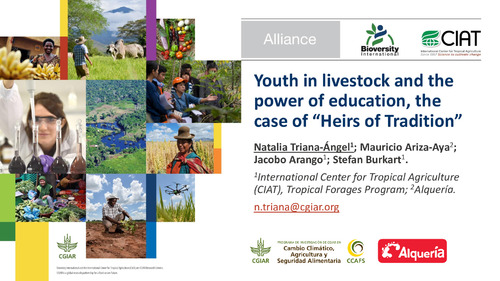Youth in livestock and the power of education, the case of “Heirs of Tradition”
Abstract
Joint, collaborative efforts between private companies and research centres in the cattle sector are still scarce. Limited resources and divergent agendas have hindered the consolidation of such alliances that can improve our understanding of the challenges and possibilities of the livestock industry, and a deeper comprehension of producer’s needs. Here we approach those subjects through a close examination of the case study “Heirs of Tradition”, an initiative carried out by Alquería’s (a major Colombian dairy company) farmer training programme. The objectives of this work are first, to assess the impact achieved through Alquería’s educational programme amongst young farmers over the last seven years. Second, to highlight the company’s recent alliance with CIAT and the CCAFS/Livestock Cross CGIAR Research Programs (CRP) in the context of the Heirs of Tradition program, and how this partnership strengthens the programmes’ productive, socioeconomic and environmental components during the 2020-2021 period. We based our analysis on information obtained through workshops, focus groups, in-depth interviews and the review of primary and secondary sources. Preliminary findings first suggest that cooperation between different actors is crucial to address a major threat in livestock production: generational relief and the massive migration of young people from rural to urban areas. Second, education initiatives and technical support can both transform, to a certain extent, the low levels of schoolings amongst rural producers and contribute to closing the gender gap that persists in the Colombian livestock sector. Third, alliances, such as the one between Alquería-CIAT-CCAFS/Livestock CRP, are critical for enriching and bolstering existing programmes by introducing new, urgent areas of expertise. Finally, we seek to shed light on the achievements and the lessons learned from “Heirs of Tradition”, highlighting the subjects and issues that could be better addressed, and overall emphasising how the continuity of these ventures favours knowledge transfer, empowers communities and benefits livestock producers across the country.

